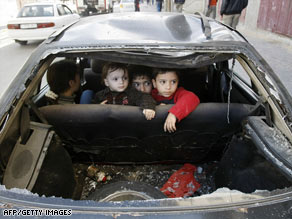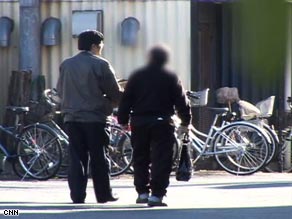GAZA CITY (CNN) -- Israeli jets pounded Hamas targets in
Gaza and Hamas militants launched more rockets into Israel, as
Palestinian security sources said Sunday that at least 277 people had
been killed and hundreds wounded.

Palestinian children sit in a car with its rear window broken after an Israeli airstrike in Gaza City on Sunday.
Israel will call
up 7,000 reserve soldiers, Defense Minister Ehud Barak said during the
weekly Cabinet meeting. He told ministers he planned to present the
measure to two Knesset committees, which must approve the action.
Meanwhile, Israeli ground troops and tanks were deployed around Gaza.
There is no indication of a ground operation inside Gaza, but a senior
military official said the air raids would continue and that troops
around Gaza will "be activated if needed."
The U.N. called for a
halt to hostilities, but Israeli Prime Minister Ehud Olmert said at the
Cabinet meeting that the operation "is liable to continue for some
time, perhaps more than can be foreseen at the present time."
Hamas, too, showed no signs of backing down.
For a second day, black plumes of smoke rose above Gaza City as
makeshift ambulances screamed down rubble-strewn streets, taking
wounded Palestinians to hospitals already crowded with hundreds of
patients injured this weekend.  Watch parts of Gaza reduced to shambles »
Watch parts of Gaza reduced to shambles »
Terrified people huddled in their basements for safety, with few
venturing outside, said Dr. Eyad El-Sarraj, a psychiatrist who runs
Gaza's mental health program.
"The children are terrified,"
El-Sarraj said. "Adults are unable to provide them with security or
warmth. Hospitals are stretched out of the limits. We need blood and
medicine and surgical equipment."
He further warned that Gaza is heading for "a major humanitarian disaster" unless the fighting ends.
srael has said the airstrikes are a necessary self-defense measure
after repeated rocket attacks from Gaza into southern Israel by Hamas
militants.  Watch an ambassador say Israel is only defending itself »
Watch an ambassador say Israel is only defending itself »
The U.N. Security Council ended a four-hour emergency meeting Sunday
with a call for an immediate halt to hostilities and a re-opening of
border crossings to allow humanitarian supplies to reach Gaza.
The Palestinians' U.N. envoy said if Israel does not halt attacks
within 48 hours, Arab delegations will demand stronger action from the
Security Council.
Israel gave in to requests from the Red Cross
and others to allow 16 trucks loaded with fuel, food and medical
supplies into Gaza through the Kerem Shalom crossing Sunday morning.
Egypt sent 20 ambulances to its border with Gaza, an Egyptian official
said.
The Red Cross and World Food Program trucks, which
carried rice, wheat and medical supplies, were the first deliveries
allowed by Israel since 80 trucks moved through Friday after Israel
opened three border crossings.
More than 110 Hamas rockets have been launched into Israel by Hamas
militants since Saturday morning, an Israel Defense Forces spokesman
said. An Israeli man died when a rocket slammed into a home Saturday,
IDF said.
An Israeli police spokesman said that one rocket
landed north of Ashkelon, which sits about 6 miles (10 kilometers)
north of the Gaza border. The city has been a frequent target of
missiles launched from Gaza.
Gaza City's main police station and jail were hit by Israeli missiles Sunday morning, according to a Gaza-based journalist.
At least two people were killed when a missile struck the Seraya
compound, which houses various Hamas military organizations in central
Gaza City. Another two people were killed when an airstrike hit a
vehicle.
Missiles also hit near the Beit Hanoun City Hall,
according to a reporter there, and Palestinian sources said Israeli
bombs fell on the Palestinian side of the Rafah tunnels on the Egyptian
border with southern Gaza.
An Israeli army spokesman confirmed
the airstrike. He said it targeted 40 tunnels on the border, which he
said Hamas uses to smuggle weapons into Gaza.
Two tunnels were hit by missiles, eyewitnesses said, and others collapsed. Two people were killed.
Palestinians began trying to cross over into Egypt through a hole in
the wall after the bombing, the witnesses said, but Egyptian police and
Hamas gunmen began firing in an attempt to stop them.
More
than 40 airstrikes were carried out Sunday, the Israeli army said. An
IDF spokesman said Israel had struck 210 Hamas targets since Saturday
morning.
Riyad Mansour, the Palestinian envoy to the U.N., said
the casualty toll in the past day forced U.N. Security Council members
to confront Israel to end the attacks.  Watch Mansour condemn attacks »
Watch Mansour condemn attacks »
The Security Council issued a brief press statement, which fell short of the resolution that the Palestinians requested.
The statement expressed "serious concern at the escalation of the
situation in Gaza," but it did not single out Israel or Hamas when it
called for "an immediate halt for all violence."
Israel's
ambassador to the U.N., Gabriela Shalev, responded that her country was
only defending itself from Hamas rocket attacks.
"The last
days were so bad that we had to say, and did say, 'Enough is enough,' "
Shalev said. "The only party to blame is the Hamas."
Hamas,
however, vowed to retaliate, saying Israel had violated an
Egyptian-brokered cease-fire intended to stem violence in the region.
"We will stand up, we will defend our own people, we will defend our
land and we will not give up," senior spokesman Osama Hamdan said.  Read reactions to Israel's strike on Gaza »
Read reactions to Israel's strike on Gaza »
The U.S. ambassador to the U.N., Zalmay Khalilzad, supported Israel's contention that it was up to Hamas to stop the violence.
"Israel has the right to self-defense and nothing in this press statement should be read as anything but that," Khalilzad said.
The United States has cautioned Israel, however, to avoid civilian
casualties. Israeli leaders maintain they are attempting to do so.
Anti-Israeli demonstrations erupted in the West Bank. One person
was killed and three others injured in a demonstration in Niilin, a
Palestinian official said. An Israeli military spokeswoman said
hundreds of Palestinians threw rocks and then fired shots at Israeli
forces that were attempting to disperse them.
The power base for Abbas' Fatah party is in the West Bank. The party is
locked in a power struggle with Hamas, which won parliamentary
elections in January 2006 and wrested Gaza from Fatah in violent
clashes last year. Abbas, a U.S. ally, wields little influence in Gaza.













